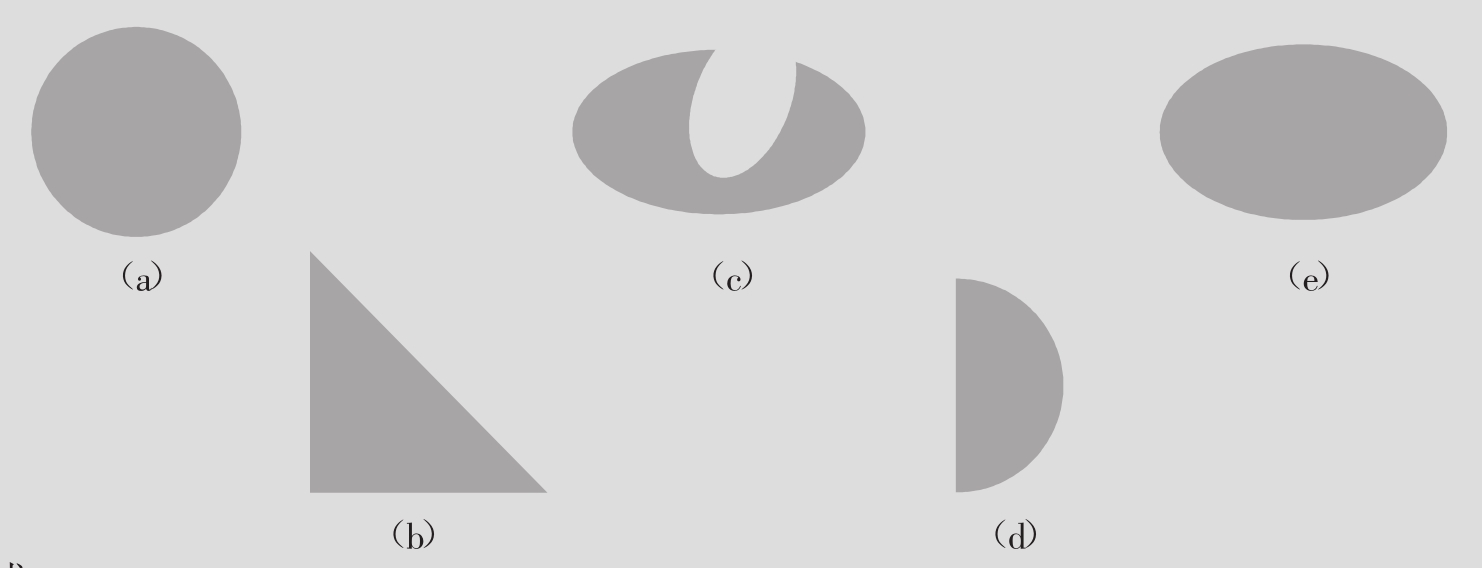1.9 个人理解与技能练习
目标
完成这个练习将会有助于你提高以下技能:
▶了解人们思考的不同方式
▶说明并证实你的决策方法
▶参加小团队的讨论
练习
如下有五张图。

你被要求:
1.选择与众不同的一个。
2.在小团队中讨论个人选择的原因,并为证实你自己的结论做好准备。
3.考察你们是否能够达成一致,得出唯一的团体答案。
讨论
■团队成员在多大程度上理解了他人的思维过程。
■如果你被劝说改变立场,决策将会以什么为基础来制定。
■从这个练习中你能得出什么结论。
要获得更多的问题、带注解的网络链接、案例材料和互联网研究材料,请登录我们的网站www.booksites.net/mullins。
注释与参考书目
1.Cited in Robinson,G.‘Managers Under the Spotlight’,The British Journal of Administrative Management,September/October 1997,p.5.
2.Bickerstaffe,G.‘Mastering Management’,Financial Times,27 October 1995,p.2.
3.Foong,K.and Yorston,R.‘Human Capital Measurement and Reporting A British Perspective’,London Business School,June 2003,p.3.
4.‘Accounting for People’,Report of the Task Force on Human Capital Management,DTI,October 2003,p.3.
5.Ibid.,p.2.
6.Drummond,H.Introduction to Organizational Behaviour,Oxford University Press(2000).
7.Ghoshal,S.,Bartlett,C.A.and Moran,P.‘Value Creation:The New Millennium Management Manifesto’,in Chowdhury,S.Management 21C,Financial Times Prentice Hall(2000),pp.121-40.
8.Taylor,R.‘The Future of Employment Relations’,Economic and Social Research Council,September 2001,pp.7-8.
9.Bouchikhi,H.and Kimberly,J.R.‘The Customized Workplace’,in Chowdhury,S.Management 21C,Financial Times Prentice Hall(2000),pp.207-19.
10.Muzyka,D.‘Thriving on the Chaos of the Future’,in Pickford,J.(ed.)Financial Times Mastering Management 2.0,Financial Times Prentice Hall(2001),p.8.
11.Cloke,K.and Goldsmith,J.The End of Management:and the Rise of Organizational Democracy,Jossey-Bass(2002).
12.For an account of key issues in e-business,see for example:‘Accenture’,supplement to Management Today,January 2001.
13.Kermally,S.‘E-strategy is Key to Future Success’,Professional Manager,July 2001,pp.28-9.
14.Fitzsimmons,G.‘It’s People Who Manage Knowledge-Not Computers’,The British Journal of Administrative Management,March/April 2000,p.16.
15.A similar view is taken by Watson,T.J.Organising and Managing Work:organisational,managerial and strategic behaviour in theory and practice,Financial Times Prentice Hall(2002).
16.See,for example:Billsberry,J.(ed.)‘There’s Nothing So Practical as a Good Theory:How Can Theory Help Managers Become More Effective?’in The Effective Manager:Perspectives and Illustrations,Sage Publications(1996),pp.1-27;and Naylor,J.Management,Finan cial Times Pitman Publishing(1999),pp.18-20.
17.Lee,R.A.‘There is Nothing so Useful as an Appropriate Theory’,in Wilson,D.C.and Rosenfeld,R.H.Managing Organizations:Text,Readingsand Cases,McGraw-Hill(1990),p.31.
18.Crainer,S.‘The Rise of Guru Scepticism’,Management Today,March 1996,pp.48-52.
19.Patching,K.Management and Organisation Development,Macmillan Business(1999),p.11.
20.Based on Mullins,L.J.‘Tackling Case Studies’,Student Administrator,vol.1,no.5,June 1984.See also:Ainsworth,A.‘Tackling Case studies’,Supplement to Chartered Secretary,January 2000.
21.Mumford,A.‘When to Use The Case Method’,ECCHO:The Newsletter of the European Case Clearing House,Autumn/Fall 1997,pp.16-17.
22.See,for example:Easton,G.Learning From Case Studies,Second edition,Prentice-Hall(1992).
23.Orpen,C.‘Reconsidering the Case-Study Method of Management Teaching’,Journal of European Business Education,Buckinghamshire Business School,vol.9,no.2,May 2000,pp.56-64.
24.Hazard,H.‘An Action Learning Teacher Reflects on Case Teaching’,ECCHO:The Newsletter of the European Case Clearing House,Issue No.22,Autumn/Fall 1999,pp.5-7.
免责声明:以上内容源自网络,版权归原作者所有,如有侵犯您的原创版权请告知,我们将尽快删除相关内容。














